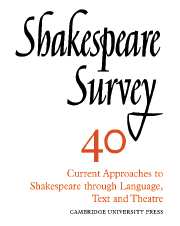Book contents
- Frontmatter
- Reconstructing Shakespeare, or Harlotry in Bardolatry
- Playing Shakespeare
- Take me to your Leda
- Sign Theory and Shakespeare
- Time in Richard III
- New Concepts of Staging A Midsummer Night’s Dream
- Henry V as Working-House of Ideology
- Shakespeare and his Sources: Observations on the Critical History of Julius Caesar
- The Speculative Eye: Problematic Self-Knowledge in Julius Caesar
- Learning by Talking: Conversation in As You Like It
- Measure for Measure: Mirror for Mirror
- Allegory and Irony in Othello
- Cruelty, King Lear and the South African Land Act 1913
- The Rationale of Current Bibliographical Methods: Printing House Studies, Computer-Aided Compositor Studies, and the Use of Statistical Methods
- Shakespeare’s Late Plays at Stratford, Ontario
- Shakespeare Performances in London, Manchester and Stratford-upon-Avon 1985–6
- The Year's Contributions to Shakespearian Study 1 Critical Studies
- 2 Shakespeare’s Life, Times, and Stage
- 3 Editions and Textual Studies
- Index
Learning by Talking: Conversation in As You Like It
Published online by Cambridge University Press: 28 March 2007
- Frontmatter
- Reconstructing Shakespeare, or Harlotry in Bardolatry
- Playing Shakespeare
- Take me to your Leda
- Sign Theory and Shakespeare
- Time in Richard III
- New Concepts of Staging A Midsummer Night’s Dream
- Henry V as Working-House of Ideology
- Shakespeare and his Sources: Observations on the Critical History of Julius Caesar
- The Speculative Eye: Problematic Self-Knowledge in Julius Caesar
- Learning by Talking: Conversation in As You Like It
- Measure for Measure: Mirror for Mirror
- Allegory and Irony in Othello
- Cruelty, King Lear and the South African Land Act 1913
- The Rationale of Current Bibliographical Methods: Printing House Studies, Computer-Aided Compositor Studies, and the Use of Statistical Methods
- Shakespeare’s Late Plays at Stratford, Ontario
- Shakespeare Performances in London, Manchester and Stratford-upon-Avon 1985–6
- The Year's Contributions to Shakespearian Study 1 Critical Studies
- 2 Shakespeare’s Life, Times, and Stage
- 3 Editions and Textual Studies
- Index
Summary
Just before the marriage celebration in As You Like It while Rosalind is off stage changing into her wedding dress, Touchstone delivers a long set piece on various sorts of lies used in quarrels and duels. He ends with , 'Your If is the only peacemaker. Muck virtue in If' (5.4.102-3). Immediately, Rosalind and Celia return with Hymen who pronounces a vision of marriage as an aspect of cosmic harmony; and in rhyme:
Then is there mirth in heaven
When earthly things made even
Atone together.
(5.4.108-10)In this paper I propose to examine the virtues of 'supposing', of 'if especially as it defines and frames the conversations between Rosalind and Orlando, but also and by extension as it stands for the importance of some deceit to work out the complexities of conversation and sexuality between the lovers, and to bring the play to its happy conclusion. The sort of habit of mind which the play encourages and which I wish to describe by focusing on this word 'if is the habit of mind that allows for comedy and romance; for example, if it is possible for such a place as Arden to exist, perhaps it is also possible to bridge the gap between an ideal of some sort and the 'real world' of the play, and to bring some of the one into the other. Or, if spring comes again each year, so might one rediscover a lost child, a lost innocence, a lapsed generosity.
- Type
- Chapter
- Information
- Shakespeare Survey , pp. 91 - 106Publisher: Cambridge University PressPrint publication year: 1988



